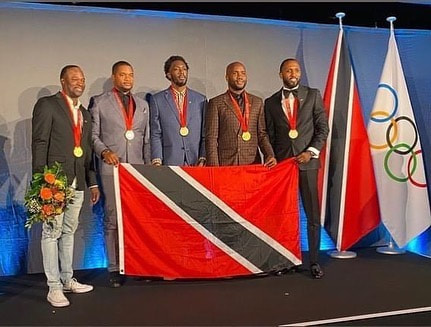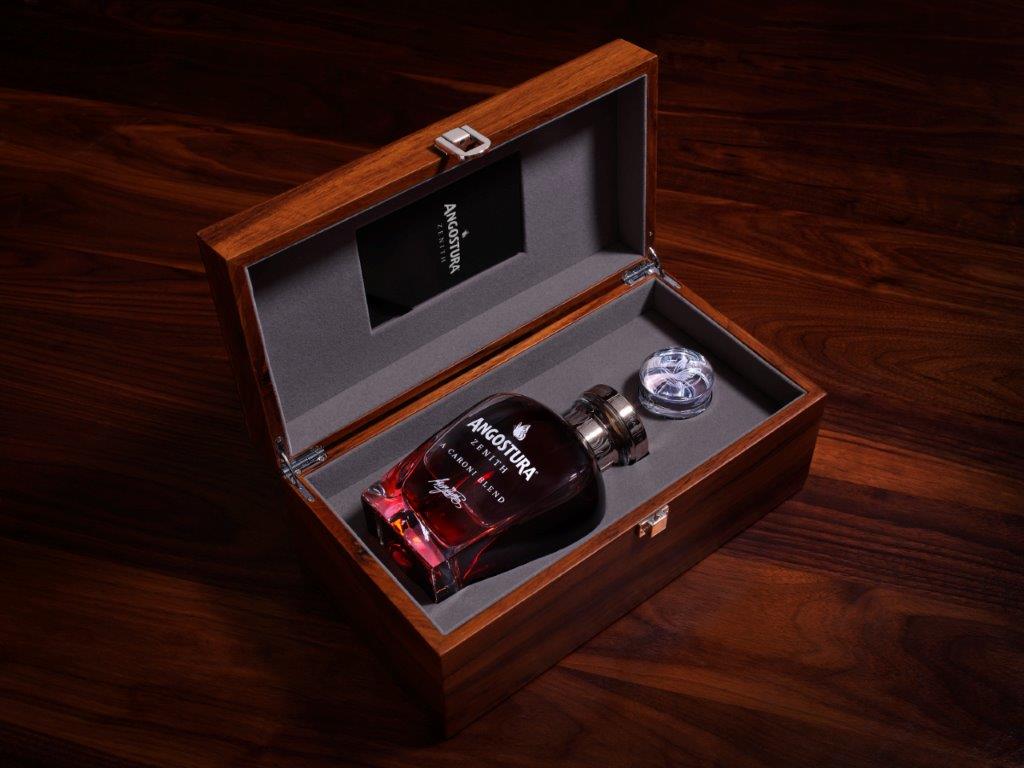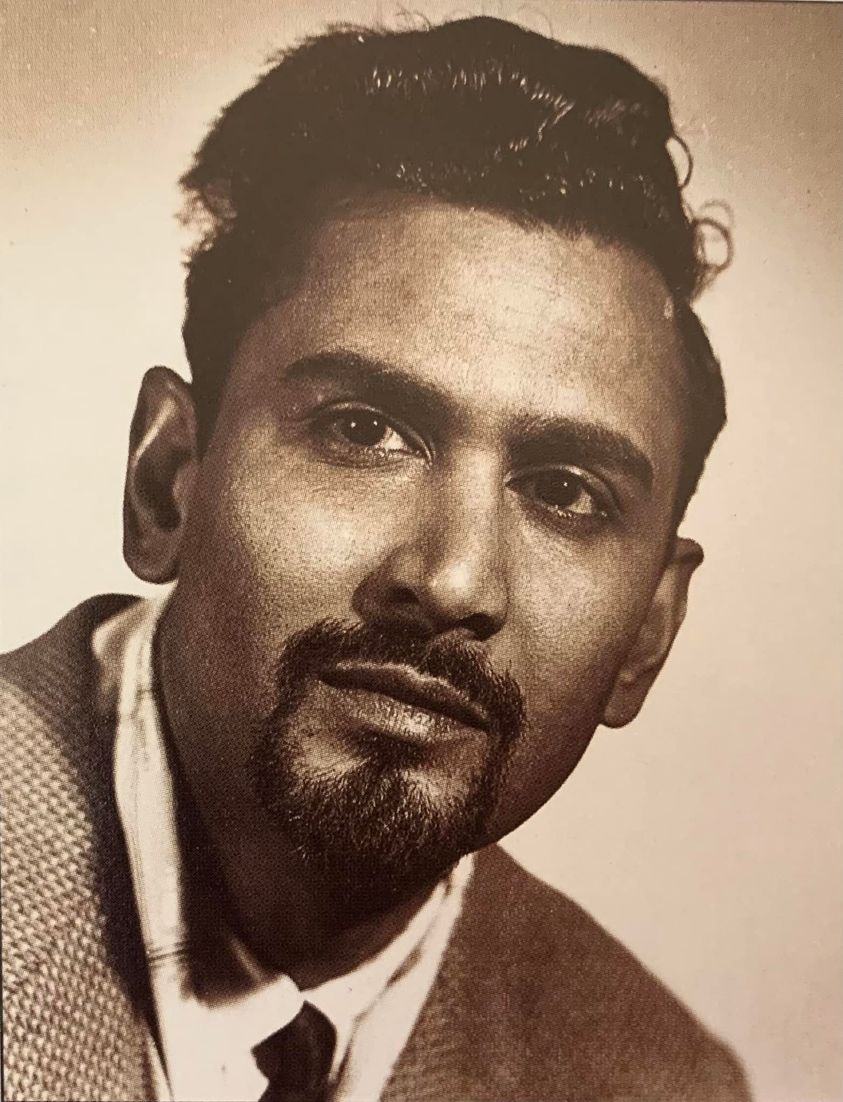|
Congratulations to the Trinidad and Tobago 2008 Olympic 4x100m CHAMPIONS!
Earlier today, the International Olympic Committee hosted the Olympic Medal Reallocation Ceremony at the Olympic Museum in Lausanne Switzerland. Trinidad and Tobago originally finished the race in 2nd place behind Jamaica, however, due a doping violation by one of the Jamaican athletes T&T was promoted to the Gold Medal position. The team in running order: Keston Bledman Marc Burns Emmanuel Callender Richard Thompson Aaron Armstrong ran the preliminary round in place of Emmanuel Callender!
0 Comments
he House of Angostura® has unveiled its new ultra-premium rum - Angostura® Zenith.
This Limited-Edition rum will join Angostura’s esteemed Private Cask Collection. Just 195 bottles have been produced globally. Chairman of Angostura Holdings Limited, Terrence Bharath said: “In keeping with our ongoing corporate social responsibility initiatives, we are pleased to announce that part proceeds from the sale of the 195 bottles of Zenith will go towards providing a scholarship for a deserving young person to be given the opportunity to pursue studies in music or art. We feel that it is our social duty to help those underprivileged communities where there are persons who possess the inherent creative gifts to rise above their circumstances and soar in reaching their goals.” A release from Angostura noted that the distinguished flavours of Zenith are derived from two of Trinidad and Tobago’s most iconic distilleries – Caroni 1975 Limited and Angostura Limited. Aged in charred American oak casks that were once used for bourbon, Angostura® Zenith combines flavours of sweet and smoky depths, delivering a fine character with a unique blend of Angostura® and Caroni aged rums ranging from 20 to 23 years old. Zenith takes the House of Angostura® Private Cask Collection to new heights with the last of the best of the legendary House of Caroni. Established in 1923 on the site of the old Caroni sugar factory, the now defunct Caroni Distillery produced highly sought-after rums notable for a distinctive heavy profile, rich, earthy, and smoky. The premium rum is produced with the last of Caroni's treasured molasses, and features rich aromas of cocoa, oaky notes with hints of raisins on the palate and subtle apple notes, complete with warm aged notes of sherry with a lasting dry, crisp finish – the perfect proportions to achieve absolute depth and balance. Rich gold in color, Angostura® Zenith has a deeply complex character, brimming over with sweet tropical fruits, warm vanilla toffee, indulgent cocoa and a dry, crisp oak smokiness. The House of Angostura® Private Cask collection consists of a range of Limited-Edition mature rums originating from specially selected casks with a dedication to artistry and craftsmanship. It captures the ageing process of Angostura® award-winning rums, while highlighting the journey of the rums from cane field to the shelf. Bharath said: “After 3 years in development, we’re delighted to extend our Private Cask Collection with the launch of Angostura® Zenith, making our rum offering one of the most unique in the world. We are constantly striving to bring the spirit of Trinidad & Tobago to rum connoisseurs around the world and the launch of Angostura® Zenith demonstrates our commitment to producing world class rums.” A collector’s must-have, Angostura® Zenith, limited to 195 bottles is available at a cost of TT$20,400 or US$3,000 at select retailers. (Source: The Loop, July 5, 2022) In addition to his unique name, Amilcar Sanatan is also a man with a unique perspective. He doesn’t confine himself to the “boundaries of the world” he was born into nor the ones given to him. He continues to push against these boundaries through his work with East PoS communities, art, writing and activism. For him, it is about seeking love and justice in all things and contributing to institutions to develop long-term investments and structures that transform environments and lives. This is his MENtions story:
– I loved my younger years. They were full of adventure. I took part in cricket, football, Taekwondo and badminton. I played the piano and, for a short time, the tenor saxophone. I wrote poetry, sang and chanted in school competitions and organised open mic competitions. I enjoyed eating “fat pork” from trees and doubles in Curepe. I spent hours observing the world of taxi drivers, casino workers, Chinese food restaurants, thieves and school children living their freedom without responsibility in the streets. I can’t count the number of times I had to run away from robbers and gun men. In the vacation before Form 3, I was diagnosed with meningitis. I did not understand why all my family members and the parish priest had visited me. I just thought I had a fever and I would be home soon. I did not understand the potential damage and disability that could happen without urgent and effective treatment. After I fully recovered, I lived every day with a sense of joy and gratitude. People die from meningitis. In fact, I have met youth who lost their hearing because of it. I was lucky in terms of health recovery and lucky to have the financial support and network that paid for my health expenses. I understand what it feels like to be a survivor and the privilege of economic class. I never accepted the boundaries of the world I was born into or the ones given to me. I push against these boundaries to this day. “Demanding fairness at a young age” In Form 5, I did English A, Mathematics, French, History, Geography, Principles of Accounts, Principles of Business, Economics and Art. I dropped Physics in Form 4. I achieved one- Grade 1, five- Grade 2s, one – Grade 3, one ‘B’ and one ‘E’. I told my parents that the ‘E’ was for excellence. In Form 6, I did French, History and Management of Business. Again, I was a student with an average academic performance. My first protest was in secondary school, demanding fairness regarding the right to grow my hair naturally at any length. I really think this is where I came into my own. Since then, the school has changed their position and young men whose hair grow in diverse textures and directions continue to contribute to the school’s success. They chose collective freedom and individual creative expression rather than tradition and control. Bishop Anstey Trinity College East (BATCE) is the school of collective freedom and individual creative expression in Trinidad and Tobago. These values are essential to the development of the leaders in our society. I also served as President of The UWI Guild of Students, national representative for the Commonwealth Students’ Association and in the leadership of the Global Student Forum. My early university student years involved poetry, student organisation in U.WE SPEAK, public advocacy in the media, on campus and in Port-of-Spain, commissioning graffiti art on the “whisper wall,” organising with the Socialist Student Conference, winning the lobby for improved watercooler facilities on campus, and networking the Caribbean youth and student movement into the global student movement. “I have a calling, not a career” At University, I completed a B.Sc. degree in Psychology and an M.Phil. degree in Interdisciplinary Gender Studies. I made the decision to set standards for my academic performance in my current Ph.D. in Cultural Studies programme. I’ve received A’s in all my courses and I was the recipient of the Elsa Goveia Scholarship for Caribbean Studies at The UWI. As you can see, my areas of study do not show a clear career path. In fact, they show that I have the capacity to serve in multiple sectors and areas of development. This is why I believe that I have a calling, not a career. I also lectured in Gender and Development and Geography. In both disciplines, I brought the work of the classroom into public space. When I teach, I exchange knowledge and affirm the spirit of students committed to a more fair, equal and just nation, Caribbean and world. “Connect the work to ordinary people” I seek to understand, describe and transform my world. My art, academic writing and activism are all essential to that process. Combined, they advance leadership. My mother and father were my first advisors. They both emerged from contexts of poverty and rose to the ranks of community-based, regional and international academic and civil society leadership. For leadership, you need to develop confidence and you need to be properly trained. To be a transformational leader, you need to connect the work you do to ordinary people. I am neither a man of providence nor certainties. I do not know what my purpose is in life, if there is one. I seek love and justice in all things. I want to contribute to institutions, to develop long-term investments and structures that transform environments and lives. I do not seek fame or riches on this earth. I want to be useful to others in this brief life while loving people and places along the way. “I serve the people of East Port-of-Spain with my heart, mind and hands.” Currently, I am the Project Coordinator for Socio-Economic Projects at East Port of Spain Development Company. I work full time in Laventille with a mandate for social and economic transformation of communities. My everyday reality moves from Latrine Eradication Programmes to empowering women in sewing classes to reflections on inclusion in urban planning and governance. Now that I am here, I am more committed to deepening the democratic process and participation in development. What is the ladder for women and men, young and old, who may not have completed secondary school? When we provide educational opportunities, how do we match them with economic opportunities? This is hard work. Deep relationships with the people, not public relations, change lives. Mrs. Nadia Figaro-Adams first introduced me to trainees and residents at SERVOL Beetham Campus where I organised youth-led workshops on gender-based violence, student governance and spoken word open mics. My father was raised in Laventille. Commitment brought me to this place. There is something special about workers who can do desk research, coordinate programmes, engage communities and communicate professionally in the street, over a drain, in the track and by email. Ah special? Growth has little to do with CVs and a public profile I am inspired by movements. At my desk, I have portraits of María Elena Moyano of Peru, Marielle Franco of Brazil, Amílcar Cabral of Guinea-Bissau and Father Michael Makhan of Trinidad and Tobago. These are leaders of movements who worked among the poor. I also have photos of my grandparents and parents on my desk. I come from a family of cocoa labourers on one side. My family is a movement. I am committed to the work of the poor and my family. I have learnt from many professional and public leaders – close up and at a distance. Policy-makers, professors and priests influenced my vision and work in some way. However, the professional part is easiest. I think character is the hard part to build. Growth has little to do with CVs and public profile, it has to do more with attitude, care, humility and commitment. Mentors are not people to help me make the next professional step, that is on me. Mentors get my mind right. My sixth form principal, Mrs. Joan Mason provided a model of leadership for me at a young age. She showed me how to elevate the standards of institutions while providing care for people on a one-on-one basis. Different models of leadership There are many examples of black male leadership in Trinidad and Tobago. What I would like to see more of are models of leadership that embrace young men and work through their vulnerabilities; a model of leadership that is accountable to women’s rights and the livelihoods of women and girls; a model of leadership that is democratic, believes in the equality of all people; a model of leadership that builds boys and men up with love for themselves, for women and girls and their communities. If I could speak to my teenage self, I would say “You win with love” and don’t worry about losing your virginity, worry about losing your metabolism. But, to the teenager who may be confused about their career or next steps after leaving secondary school or degree programme, I want you to serve well and serve selflessly. Make every day count in your personal and professional development. Excellent work and service, create opportunity for more work and service. (Source: MENtions,May 22, 2022) – Amilcar is a former student of The University School, St Augustine; Combermere School, Barbados; Trinity College East, BATCE Sixth Form School and The UWI, St Augustine. Stoicism, Catholic social teaching, RastafarI livity, the ideal of moksha and the writing of Kahlil Gibran keep him centred. He walks daily for two hours to clear his mind and meditates. Watching sport, episodes of 90 day Fiancé, Catfish or Samurai X and Judge Judy with his mother, are how he spends his free time. One of the best known names in Caribbean literature, Sam Selvon, was born on May 20th in 1923!
As an author, Selvon is celebrated for his vivid depictions of Caribbean life and stories of West Indian migration. Many of his later writings drew from his experiences as a member of the Windrush generation of Caribbean immigrants to Britain in the 1950s. His book, “The Lonely Londoners” (1956) is still recognized as one of the first novels to incorporate Caribbean dialects in its telling of working-class migrant life in the UK. Over the years, Selvon authored a number of books, including “Ways of Sunlight” (1957), “Those Who Eat the Cascadura” (1972) and “Moses Ascending” (1975). In 1976, he co-wrote the screenplay for British film “Pressure” with Horace Ové, celebrated as the UK's first Black dramatic feature-length film. He was a two-time winner of the prestigious Guggenheim Fellowship, a recipient of the Hummingbird Medal (Gold, 1969) and the Chaconia Medal (posthumously, 1994). In the 1980s, Selvon was honoured with degrees from the University of the West Indies (1985) and Warwick University (1989). Born in San Fernando, Selvon attended Naparima College before serving 5 years in the West Indian Royal Navy (R.N.V.R) during WWII, on ships in the Caribbean. After the War, Selvon worked as a reporter at the Trinidad Guardian Newspaper (1945-1950). He also wrote stories under pseudonyms and had some of his work broadcast by the BBC. Encouraged by this success, he migrated to the UK in 1950 with the manuscript of his first book “A Brighter Sun” (1952). In London, Selvon worked several jobs, while his short stories were published by various British magazines. He also produced two television scripts for the BBC: “Anansi the Spider Man” and “Home Sweet India.” Selvon later moved to Canada, where he became a fellow at the University of Dundee, and a professor in creative writing at the University of Victoria. He passed away on April 16th 1994 in Trinidad. In 2018, on what would have been his 95th birthday, Selvon was honoured by Google with a “Google Doodle”. This photo of Sam Selvon is courtesy of the book “Insight Guide to Trinidad and Tobago”, published by Insight Guides, London. This book is part of the National Archives of Trinidad and Tobago Reference Collection. (Source: Trinbago Golden Memories, May 26, 2022) Born in Trinidad on June 21, 1928, Mona Baptiste became a popular singer and actress in London and Germany.
She migrated to England in 1948, one of the few women on the Empire Windrush which docked at Tilbury the day after her 20th birthday. Within six weeks she was already appearing on the BBC’s Light programme. Baptiste was largely popular for songs like 'Calypso Blues' and 'There’s Something in the Air'. In Germany, she gained recognition for songs such as 'There’s Something in the Air' and movie appearances in films like 'Tanz in der Sonne' and 'An jedem Finger zehn' in 1954. After suffering a stroke, Baptiste died on June 25, 1993, in Dublin, Ireland. Video via German Music Channel (I don’t not own the copyright) (Source: Dominic Kalipersad, June 23, 2022) |
T&T news blogThe intent of this blog is to bring some news from home and other fun items. If you enjoy what you read, please leave us a comment.. Archives
July 2025
Categories
All
|






 RSS Feed
RSS Feed